高中英语语法反义疑问句.ppt
合集下载
完整反义疑问句课件

如果陈述句是肯定的,反义疑问句应该是否定的。
2 人称一致
陈述句和反义疑问句中的主语和动词人称要保持一致。,避免使用复杂的句子结构。
结束语
通过学习反义疑问句的结构和用法,我们可以更好地理解和运用这个表达方 式,提升我们的语言表达能力。
完整反义疑问句PPT课件
PPT介绍反义疑问句
什么是反义疑问句?
反义疑问句是指一种用于提问或表示疑问的句子结构,通常由一个陈述句和一个反义疑问句构成。
反义疑问句的结构
1
陈述句部分
包含陈述句的主谓宾结构
2
反义疑问句部分
由一个助动词和一个否定词构成
3
连接词
连接陈述句和反义疑问句的部分,常用的连接词包括but和yet
反义疑问句的语气和语调
语气
反义疑问句通常用于表示疑问、请求或强调某 种认可的语气。
语调
反义疑问句通常以升调结尾,以引起对方的回 答或注意。
反义疑问句的用法与例句
询问意见
这个计划听起来很好,不是吗?
表示认可
你很喜欢这部电影,对吗?
确认信息
你不会去参加聚会,对吗?
反义疑问句的注意事项
1 肯定陈述,否定反义疑问
2 人称一致
陈述句和反义疑问句中的主语和动词人称要保持一致。,避免使用复杂的句子结构。
结束语
通过学习反义疑问句的结构和用法,我们可以更好地理解和运用这个表达方 式,提升我们的语言表达能力。
完整反义疑问句PPT课件
PPT介绍反义疑问句
什么是反义疑问句?
反义疑问句是指一种用于提问或表示疑问的句子结构,通常由一个陈述句和一个反义疑问句构成。
反义疑问句的结构
1
陈述句部分
包含陈述句的主谓宾结构
2
反义疑问句部分
由一个助动词和一个否定词构成
3
连接词
连接陈述句和反义疑问句的部分,常用的连接词包括but和yet
反义疑问句的语气和语调
语气
反义疑问句通常用于表示疑问、请求或强调某 种认可的语气。
语调
反义疑问句通常以升调结尾,以引起对方的回 答或注意。
反义疑问句的用法与例句
询问意见
这个计划听起来很好,不是吗?
表示认可
你很喜欢这部电影,对吗?
确认信息
你不会去参加聚会,对吗?
反义疑问句的注意事项
1 肯定陈述,否定反义疑问
反义疑问句归纳总结.ppt

The Swede made no answer, did he / she? Some plants never blown, do they ?
There are few apples in the basket, are there?
He can hardly swim, can he?
They seldom come late, do they?
He is not the man who gave us a talk, is he? He said he wanted to visit Japan, didn't he?
c. 上述部分主句谓语是I ;we think, believe, expect, suppose, imagine 等引 导的宾语从句,疑问部分与宾语从句相 对应构成反意疑问句。
to you in English, does she? She rarely speaks
4)含有ought to 的反意疑问句,陈述 部分是肯定的,疑问部分用shouldn't / oughtn't +主语。
He ought to know what to do, oughtn't he? / shouldn't he?
Either you or he is right,_is_n_’_t_h_e_?
13)陈述部分主语是指示代词或不定代 词 everything, that, this nothing, 疑问 部分主语用 it 。
Everything is ready, isn't it?
14)陈述部分为主语从句或并列复合句, 疑问部分有三种情况s Mr. Smith had been to Beijing for several times, he should have been in China now, shouldn't he?
There are few apples in the basket, are there?
He can hardly swim, can he?
They seldom come late, do they?
He is not the man who gave us a talk, is he? He said he wanted to visit Japan, didn't he?
c. 上述部分主句谓语是I ;we think, believe, expect, suppose, imagine 等引 导的宾语从句,疑问部分与宾语从句相 对应构成反意疑问句。
to you in English, does she? She rarely speaks
4)含有ought to 的反意疑问句,陈述 部分是肯定的,疑问部分用shouldn't / oughtn't +主语。
He ought to know what to do, oughtn't he? / shouldn't he?
Either you or he is right,_is_n_’_t_h_e_?
13)陈述部分主语是指示代词或不定代 词 everything, that, this nothing, 疑问 部分主语用 it 。
Everything is ready, isn't it?
14)陈述部分为主语从句或并列复合句, 疑问部分有三种情况s Mr. Smith had been to Beijing for several times, he should have been in China now, shouldn't he?
反义疑问句详细讲解课件(PPT27张)
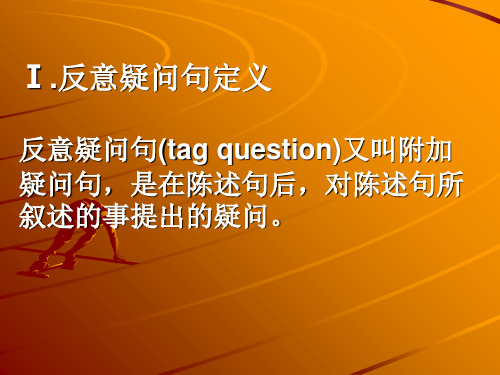
I don’t believe he has finished his work.
7.当陈述部分的主句是I think (expect, believe)等结构时,反 意疑问句的附加部分则往往与从 句中的主语和谓语动词保持对应 关系,但要注意否定的转移。 例如:
I think he’s funny, isn’t he? I don’t believe she likes my
You must have seen the film last week, didn’t you?
6. 当陈述部分是I am…时,反意疑 问句部分通常要用aren’t I;如陈述 句部分的主语是I am not时,反意疑 问句部分通常要用am I。 例如:
1)I am a teacher, aren’t I?
Ⅰ.反意疑问句定义
反意疑问句(tag question)又叫附加 疑问句,是在陈述句后,对陈述句所 叙述的事提出的疑问。
Ⅱ.基本结构:
陈述句+逗号+简短的一般疑问句?
遵循前肯定后否定前否后肯式的原则
①前肯后否式。例如:
You are all students, aren’t you﹖
②前否后肯式。例如:
Let’s have a rest, shall we? 以let us开头的祈使句,不包括 说话人在内,因此反意疑问句的 附加部分用will you。例如:
Let us stop now, will you?
Ⅳ. 反意疑问句的回答 “ 根据事实回答”
对反意疑问句的回答,无论问题的提法如何,如果 事实是肯定的,就用yes,事实是否定的,就要用no。 要特别注意陈述句部分是否定结构,反意疑问句部分 用肯定式提问时,回答yes或no与汉语正好相反。这 种省略回答的yes要译成“不”,no要译成“是”。
7.当陈述部分的主句是I think (expect, believe)等结构时,反 意疑问句的附加部分则往往与从 句中的主语和谓语动词保持对应 关系,但要注意否定的转移。 例如:
I think he’s funny, isn’t he? I don’t believe she likes my
You must have seen the film last week, didn’t you?
6. 当陈述部分是I am…时,反意疑 问句部分通常要用aren’t I;如陈述 句部分的主语是I am not时,反意疑 问句部分通常要用am I。 例如:
1)I am a teacher, aren’t I?
Ⅰ.反意疑问句定义
反意疑问句(tag question)又叫附加 疑问句,是在陈述句后,对陈述句所 叙述的事提出的疑问。
Ⅱ.基本结构:
陈述句+逗号+简短的一般疑问句?
遵循前肯定后否定前否后肯式的原则
①前肯后否式。例如:
You are all students, aren’t you﹖
②前否后肯式。例如:
Let’s have a rest, shall we? 以let us开头的祈使句,不包括 说话人在内,因此反意疑问句的 附加部分用will you。例如:
Let us stop now, will you?
Ⅳ. 反意疑问句的回答 “ 根据事实回答”
对反意疑问句的回答,无论问题的提法如何,如果 事实是肯定的,就用yes,事实是否定的,就要用no。 要特别注意陈述句部分是否定结构,反意疑问句部分 用肯定式提问时,回答yes或no与汉语正好相反。这 种省略回答的yes要译成“不”,no要译成“是”。
反义疑问句(共14张PPT)全

二、前否+后肯
1.She wasn’t ill last week, was she ? 2.It doesn’t often rain here, does it? 3.Tom won’t go to Shanghai next year,
will he ?
特殊用法1—祈使句的反义疑问句
1、肯定祈使句的反意疑问句,疑问部分用will you或won’t you,否定祈使句则用will you ? 如: Don't do that again, will you? Go with me, will you / won't you?
13、He who seize the right moment, is the right man.谁把握机遇,谁就心想事成。2024/10/172024/10/172024/10/172024/10/1710/17/2024 +14、谁要是自己还没有发展培养和教育好,他就不能发展培养和教育别人。2024年10月17日星期四2024/10/172024/10/172024/10/17 +15、一年之计,莫如树谷;十年之计,莫如树木;终身之计,莫如树人。2024年10月2024/10/172024/10/172024/10/1710/17/2024 +16、教学的目的是培养学生自己学习,自己研究,用自己的头脑来想,用自己的眼睛看,用自己的手来做这种精神。2024/10/172024/10/17October 17, 2024 +17、儿童是中心,教育的措施便围绕他们而组织起来。2024/10/172024/10/172024/10/172024/10/17
一 、前肯+后否 含be动词
1.He is a doctor, isn’t he? 2.I am Chinese, aren’t I?
高中英语复习 反义疑问句 (共27张PPT)
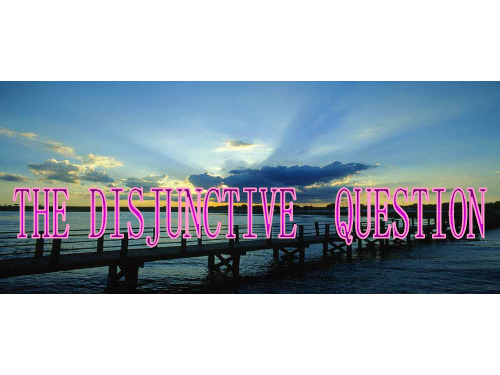
4. 完成时的反意疑问句
主语+have/has+过去分词…, haven’t (hasn’t) + 主语? He has been to America, hasn’t he ? Marry hasn’t lived in the countryside, has she ? You haven’t been to Shanghai, have you ?
简单句的反义疑问句
1.含有be动词(is, are, was, were)的句型: 现在: 主语+is (are)…, isn’t (aren’t) + 主语? 过去: 主语+was (were)…,wasn’t (weren’t) + 主语? are you You are not students, _______? The students are going to have a picnic,_______________ aren’t they ? were they ? The Greens weren’t at home last night, ______________
反意疑问句的解答步骤
1. 判定(判断该用肯定还是否定); 2. 找动(确定句子的助动词类型或情态动词:be、do 和完成have的适当形式以及情态动词的形式); 3. 换代(将主语换为代词);
Jack wasn’t playing soccer, ____ was ___? he Their parents have gone to London, haven’t they ___________? have I___? I have never been to the park, ____ don’t you You have a good friend, ______ ____? didn’t ____? we We had a meeting, _____
反义疑问句PPT课件
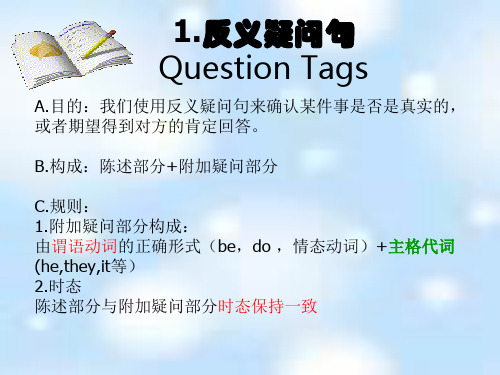
陈述部分
疑问部分
mustn't表示“禁止,不可, 不必”时
must
例句
You mustn't stop your car here,must you?
must表示“有必要”时
needn't
They must finish the work today,needn't they?
当must用来表示对现在的 情况进行推测时
She must have read the novel last week,didn't she?
Your daughter must have 要用“haven't/hasn't+主语”。 been to Africa, hasn't
she ?
You must be tired , _ar_e_n’_t _yo_u___ ?
2) 祈使句式反意疑问句
Let’s go home,_s_h_a_ll_w_e_? Let us go,__w__il_l _yo_u__? Let me go,_w__il_l _y_ou__? Come here please, __w_i_ll_y_o_u__? Never ask her again,_w__il_l /_c_a_n__y_ou__?
语
there, didn't he? / usedn't he?
had better(最好) + v.
hadn't you?
would rather(宁可、宁愿) +v.
wouldn't +主语
You'd like to +v.
反义疑问句详细讲解课件(PPT27张)

2) have to表示“不得不,必须”之意 时,附加问句的谓语应用助动词do.
Kate has to help her mother at home,doesn’t she?
3) have表示“吃,喝,玩,度过”等意 思时,其附加问句的谓语应用助动词do.
They had a good time in Beijing ,didn’t they?
Ⅰ.反意疑问句定义
反意疑问句(tag question)又叫附加 疑问句,是在陈述句后,对陈述句所 叙述的事提出的疑问。
Ⅱ.基本结构:
陈述句+逗号+简短的一般疑问句?
遵循前肯定后否定前否后肯式的原则
①前肯后否式。例如:
You are all students, aren’t you﹖
②前否后肯式。例如:
[误] Tom can speak Chinese well, can’t Tom﹖
[正] Tom can speak Chinese well, can’t he﹖
一般现在时:
Lily likes going shopping, d_o_e_s_n__’t_she? They aren’t students, __a_r_e___
You must have seen the film last week, didn’t you?
6. 当陈述部分是I am…时,反意疑 问句部分通常要用aren’t I;如陈述 句部分的主语是I am not时,反意疑 问句部分通常要用am I。 例如:
1)I am a teacher, aren’t I?
The End
They must come on time,needn’t they?
2)must表示推测,“一定,想必”之意,附加问 句的谓语动词的确定应根据must后面的动词。
Kate has to help her mother at home,doesn’t she?
3) have表示“吃,喝,玩,度过”等意 思时,其附加问句的谓语应用助动词do.
They had a good time in Beijing ,didn’t they?
Ⅰ.反意疑问句定义
反意疑问句(tag question)又叫附加 疑问句,是在陈述句后,对陈述句所 叙述的事提出的疑问。
Ⅱ.基本结构:
陈述句+逗号+简短的一般疑问句?
遵循前肯定后否定前否后肯式的原则
①前肯后否式。例如:
You are all students, aren’t you﹖
②前否后肯式。例如:
[误] Tom can speak Chinese well, can’t Tom﹖
[正] Tom can speak Chinese well, can’t he﹖
一般现在时:
Lily likes going shopping, d_o_e_s_n__’t_she? They aren’t students, __a_r_e___
You must have seen the film last week, didn’t you?
6. 当陈述部分是I am…时,反意疑 问句部分通常要用aren’t I;如陈述 句部分的主语是I am not时,反意疑 问句部分通常要用am I。 例如:
1)I am a teacher, aren’t I?
The End
They must come on time,needn’t they?
2)must表示推测,“一定,想必”之意,附加问 句的谓语动词的确定应根据must后面的动词。
高中英语语法反义疑问句-PPT
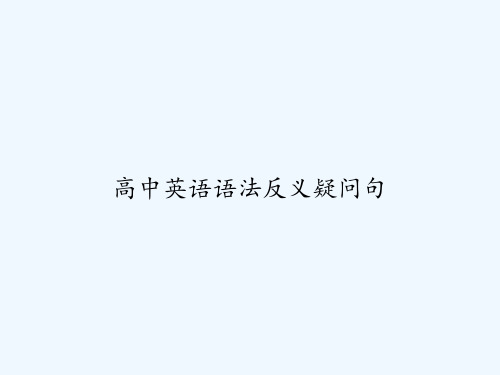
3)含有ought to 的反意疑问句, 陈述部分是肯定的,疑问部分 用oughtn't +主语。
He ought to know what to do, oughtn't he?
大家有疑问的,可以询问和交流
可以互相讨论下,
4)陈述部分有 have to + v. (had to + v.),疑问部分常用don't + 主语(didn't +主语)。
2.陈述部分为否定式 + 疑问部 分就为肯定式
You didn’t go, did you?
He can’t ride a bike, can he?
请注意以下句型的反义疑 问句:
1)陈述部分的主语是I,疑问部 分要用 aren't I.
I’m as tall as your sister, aren't I?
14)前有情态动词dare或need, 疑问部分用 need (dare ) +主语。
We need not do it again, need we ? He dare not say so, dare you?
当dare, need 为实义动词时, 疑问部分用助动词 do + 主语。
She doesn't dare to go home alone, does she?
I am a student, aren’t I?
2)陈述部分用 no, nothing, nobody, never, few, seldom, hardly, rarely, little等否定含义 的词时,疑问部分用肯定含义。
The Swede made no answer, did he / she? Some plants never blown (开花), do they ?
高中英语反义疑问句的用法归纳 课件 共27张PPT

Let us know your address, will you? 好吗?
请把你的地址告诉我们,
Let us go swimming together, shall we? 吗?
我们一起去游泳好
六、陈述局部为主从复合句的反意疑问句
• 1. 当陈述局部为主从复合句【主句+从句】时,疑问局部一般应与主句保 持一致:
• had better时,疑问局部用had:
• He’d better leave here, hadn’t he? 吗?
他最好离开这儿,是
• ought to 的反意疑问句,陈述局部是肯定的,疑问局部用 shouldn't / oughtn't +主语 He ought to know what to do, oughtn't he? / shouldn't he?
We are sure that;
I feel sure that 等后面跟宾语从句时,反意疑问句与后面的宾语从句一
致。
主语为each时, 反意疑问句的主语用he。
Each has his strong points, hasn’t he / doesn’t he?
主语为each of us, each of you, each of them时, 反意疑问句的主语用 we, you, they。
他经常要早起,是
• He has to go to bed late tonight, hasn’t he? 是吗?他今晚要迟睡,源自四、含情态动词的反意疑问句
• 1. 根本原那么:在通常情况下,当陈述局部含有情态动词时,疑问局部 会重复前面同样的情态动词:
• He can speak English, can’t he? 他会说英语,是吗?
英语语法反义疑问句ppt

祈使句的反意疑问句
肯定的祈使句:won’t you ? / will you ? 祈使句的反意疑问句
否定的祈使句:will you ? 注:Let’s … , shall we?
Let us…, will you? e.g. Let us go to watch the movie, will you ? Let’s walk to the shops instead of taking the car, shall we ? Don't play computer games, will you?
B. is she
C. did she C. hasn’t he C. did she C. don’t they C. hasn’t she
D. wasn’t she D. doesn’t he D. didn’t she D. will they D. has she
6. There won’t be any concert this Saturday evening, C ?
A. will there not
B. will there C. is there
D. won’t there
7. He dislikes the two subjects, B he?
A. does
B. doesn’t
C. is
8. Let’s go there by bus, B ?
D. isn’t
特殊的反意疑问句
特殊的反意疑问句: (1) 主+ used to do sth, didn't/usedn't+主?
She used to get up at 7 o'clock, didn't/usedn't she ?
2024届高考英语复习:反意疑问句课件

反义疑问句 教师:张老师
第一部分 知识点梳理
01 考 点 梳 理
反义疑问句的定义
在一个陈述句之后附上一个简短的疑问句,对陈述句叙述的内容提出疑问、 强调或者反问,这种疑问句叫反义疑问句。
You usually go to school by bike, don’t you ? He doesn’t like apples, does he?
• Let’s 开头的祈使句+shall we?
问句部分用will you。例如:
例如:Let‘s go there together, shall we?
Let us go out to have a rest, will you?
01 考 点 梳 理
反义疑问句的特殊情形
➢ 当陈述部分动词为 have, has, had 时要视情况而定。
01 考 点 梳 理
反义疑问句的特殊情形
➢ 当陈述部分动词为 have, has, had 时要视情况而定。
• 当have to表示“不得不”“必须”之意时,反义疑问句部分的助动词用 do 的适当形式。例如: Kate has to help her mother at home, __d_o_es_n_’_t_s_h_e_________? Tony had to walk to school yesterday, d_id_n_’_t_h_e________?
01 考 点 梳 理
反义疑问句的特殊情形
➢ 陈述句部分为祈使句,则反义疑问句的结构如下:
• 肯定祈使句+will / won't you?
例如:Come with us, will you?
• 否定祈使句+will you?
第一部分 知识点梳理
01 考 点 梳 理
反义疑问句的定义
在一个陈述句之后附上一个简短的疑问句,对陈述句叙述的内容提出疑问、 强调或者反问,这种疑问句叫反义疑问句。
You usually go to school by bike, don’t you ? He doesn’t like apples, does he?
• Let’s 开头的祈使句+shall we?
问句部分用will you。例如:
例如:Let‘s go there together, shall we?
Let us go out to have a rest, will you?
01 考 点 梳 理
反义疑问句的特殊情形
➢ 当陈述部分动词为 have, has, had 时要视情况而定。
01 考 点 梳 理
反义疑问句的特殊情形
➢ 当陈述部分动词为 have, has, had 时要视情况而定。
• 当have to表示“不得不”“必须”之意时,反义疑问句部分的助动词用 do 的适当形式。例如: Kate has to help her mother at home, __d_o_es_n_’_t_s_h_e_________? Tony had to walk to school yesterday, d_id_n_’_t_h_e________?
01 考 点 梳 理
反义疑问句的特殊情形
➢ 陈述句部分为祈使句,则反义疑问句的结构如下:
• 肯定祈使句+will / won't you?
例如:Come with us, will you?
• 否定祈使句+will you?
高考英语总复习之反义疑问句(共28页PPT)(共28张PPT)

三、反意疑问句的回答
--- Few well-known singers came to the concert, did they?
--- _____. Such as Andy Lau, Jay Chou and Kristy Zhang .
A. No, they didn’t B. Yes, they did C. No, they did
11. 感叹句
what,how引导的感叹句,疑问部分用be+主语 What a beautiful woman, isn’t she?
12. Neither nor和either or 疑问部分根据其实际逻辑意义而定。
Neither you nor I am engineer, are we? Either you or he is right, isn’t he?
15. 定语从句和宾语从句
定语从句、宾语从句:根据主句的谓语而定。
He is not the man who gave us a talk, is he? He said he wanted to visit Japan, didn’t he? This is the second time that he has been to Japan, isn’
D. Yes , they didn’t
---You were injured in the accident, weren't you ? ---________, but look, I'm all right now.
A.Yes, I was B.Yes, I did C.No, I didn't D.No, I wasn't
3. used to /ought to的反意疑问句
高中英语反意疑问句课件(共19张PPT)

let us/me/him反义疑问句:will you/won’t you。
Let,s have a rest,_____s_h_a_l_l_w_e_?_____________ Let us go home now,_____w_i_ll_y_o_u_?_______________ Let me have a rest,_______w_i_l_l _y_o_u_?__________
1、祈使句
(1)肯定的祈使句,用won ,t you 否定的祈使句,用will you.
Sit down and have a cup of tea,______w__o_n ,t you? Don ,t be late again,_______w_i_ll_y_o_u__?
(2)let’s…反义疑问句用shall we;
Nobody wants to go swimming,
does he/do they?
Neither of them is right,
is he/are they?
七
陈述部分主语是this/that时,疑问部分主语用it. 陈述部分主语是these/those时,疑问部分主语用they。
This is my ruler,
九
(1)当陈述部分是一个带有that引导的宾语从句时,疑问部分 与主句的主语和谓语保持一致。
She said that it was worth doing,
didn’t she?
He said that his father had gone to America, didn’t he?
(2)陈述部分是I think (suppose/expect/believe/imagine)从句时, 疑问部分要与从句中的主语和谓语保持一致。要注意否定前移现象。
Let,s have a rest,_____s_h_a_l_l_w_e_?_____________ Let us go home now,_____w_i_ll_y_o_u_?_______________ Let me have a rest,_______w_i_l_l _y_o_u_?__________
1、祈使句
(1)肯定的祈使句,用won ,t you 否定的祈使句,用will you.
Sit down and have a cup of tea,______w__o_n ,t you? Don ,t be late again,_______w_i_ll_y_o_u__?
(2)let’s…反义疑问句用shall we;
Nobody wants to go swimming,
does he/do they?
Neither of them is right,
is he/are they?
七
陈述部分主语是this/that时,疑问部分主语用it. 陈述部分主语是these/those时,疑问部分主语用they。
This is my ruler,
九
(1)当陈述部分是一个带有that引导的宾语从句时,疑问部分 与主句的主语和谓语保持一致。
She said that it was worth doing,
didn’t she?
He said that his father had gone to America, didn’t he?
(2)陈述部分是I think (suppose/expect/believe/imagine)从句时, 疑问部分要与从句中的主语和谓语保持一致。要注意否定前移现象。
高考英语语法复习反义疑问句课件
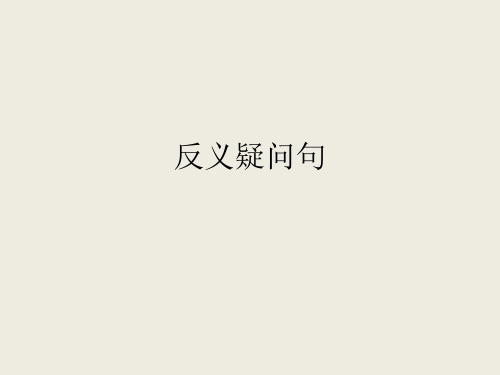
he?
• Eg:She must be looking forward to your return,___?
• A.mustn’t she B.wasn’t she C.isn’t she D.didn’t she
•C
• 三、主从复合句中和主句保持一致。但如 果
• 1.主句的主语为一人称I或we。
The Swede made no answer, did he / she? Some plants never blown (开花), do they ?
• 4) 含有ought to 的反意疑问句,陈述部分是肯定 的,疑问部分用shouldn't / oughtn't +主语。
He ought to know what to do, oughtn't he? / shouldn't he? • 5) 陈述部分有have to +v. (had to + v.),疑问部分 常用don't +主语(didn't +主语)。
二、情态动词
Must do
must
Must have done (包 括其 它情 态动 词)
必须
前肯后 否
前否后 肯
Needn’t /mustn’t +主语
Must+ 主语
肯定(表推测,包 与must后的动词 括其它情态动词) 一致
无表过去的时间状 Have not/has
语
not+主语
didn't/
• I don’t think he should go out,( )? • Should he • I didn’t think he should go out,( )? • Did I
• Eg:She must be looking forward to your return,___?
• A.mustn’t she B.wasn’t she C.isn’t she D.didn’t she
•C
• 三、主从复合句中和主句保持一致。但如 果
• 1.主句的主语为一人称I或we。
The Swede made no answer, did he / she? Some plants never blown (开花), do they ?
• 4) 含有ought to 的反意疑问句,陈述部分是肯定 的,疑问部分用shouldn't / oughtn't +主语。
He ought to know what to do, oughtn't he? / shouldn't he? • 5) 陈述部分有have to +v. (had to + v.),疑问部分 常用don't +主语(didn't +主语)。
二、情态动词
Must do
must
Must have done (包 括其 它情 态动 词)
必须
前肯后 否
前否后 肯
Needn’t /mustn’t +主语
Must+ 主语
肯定(表推测,包 与must后的动词 括其它情态动词) 一致
无表过去的时间状 Have not/has
语
not+主语
didn't/
• I don’t think he should go out,( )? • Should he • I didn’t think he should go out,( )? • Did I
相关主题
- 1、下载文档前请自行甄别文档内容的完整性,平台不提供额外的编辑、内容补充、找答案等附加服务。
- 2、"仅部分预览"的文档,不可在线预览部分如存在完整性等问题,可反馈申请退款(可完整预览的文档不适用该条件!)。
- 3、如文档侵犯您的权益,请联系客服反馈,我们会尽快为您处理(人工客服工作时间:9:00-18:30)。
10)陈述部分主语是指示代词或 不定代词 everything, that, this nothing等时, 疑问部分主语用 it 。 Everything is ready, isn't it?
11)带有定语从句,宾语从句等 的主从复合句,疑问部分谓语根 据主句的谓语而定: He is not the man who gave us a talk, is he? He said he wanted to visit Japan, didn't he?
I am a student, aren’t I?
2)陈述部分用 no, nothing, nobody, never, few, seldom, hardly, rarely, little等否定含义 的词时,疑问部分用肯定含义。 The Swede made no answer, did he / she? Some plants never blown (开花), do they ?
13) 陈述部分主语是不定代词 everybody, anyone, somebody, nobody, no one等,疑问部分常 用复数they,有时也用单数he。
Everyone knows the answer, don't they? (does he?) Nobody knows about it, do they? (does he?)
2.陈述部分为否定式 + 疑问部 分就为肯定式 You didn’t go, did you? He can’t ride a bike, can he?
请注意以下句型的反义疑 问句:
1)陈述部分的主语是I,疑问部 分要用 aren't I. I’m as tall as your sister, aren't I?
16)陈述部分是“there be”结构 时: There is something wrong with your watch, isn't there? There will not be any trouble, will there? There were many people in the room then, weren’t there?
Let's go and listen to the music, shall we? Let us wait for you in the reading-room, will you ?
It is a fine day. Let’s go fishing, shall we _______? will you Let us do this job,_______? will you/won’t you Turn on the radio,_______?
17)否定前缀不能视为否定词, 其反意疑问句仍用否定形式。 It is impossible, isn't it?
He is not unkind to his classmates, is he?
18. 反义疑问句的回答用yes,no 但是,当陈述部分是否定形式时, 回答要按事实走。 They don’t work hard, do they? Yes, they do.
14)前有情态动词dare或need, 疑问部分用 need (dare ) +主语。
We need not do it again, need we ? He dare not say so, dare you?
当dare, need 为实义动词时, 疑问部分用助动词 do + 主语。 She doesn't dare to go home alone, does she?
We have to get there at eight tomorrow, don't we?
They had to cross the busy street, didn’t they?
5)陈述部分的谓语是used to 时ห้องสมุดไป่ตู้ 疑问部分用didn't +主语或 usedn't +主语。
He used to take pictures there, didn't he? She used to stay up late, usedn’t she?
反义疑问句 又叫附加疑问句。反义疑问句由 两部分组成:前一部分是一个陈 述句,后一部分是一个简短的疑 问句,两部分的人称时态应保持 一致。
1.陈述部分为肯定式 + 疑问部 分就为否定式
They work here, don’t they?
She was ill yesterday, wasn’t she?
12)I /we think(believe, expect, suppose, imagine,guess)后加宾语从句时,反义疑 问部分与宾语从句相一致。
I think he is bright, isn’t he? We believe she can do it better, can't she? I don't think he is bright, is he? She thinks he is bright, doesn’t she? She doesn’t think he is bright, does she?
6)陈述部分有had better + v. 疑 问句部分用hadn't you?
You'd better read it by yourself, hadn't you?
7)陈述部分有would rather + v. 疑问部分用 wouldn't +主语。
He would rather read it ten times than recite it, wouldn't he?
8)陈述部分有You'd like to + v. 疑问部分用wouldn't +主语。 You’d like to go with me, wouldn't you?
9)must表示“推测”时,如何确 定反意疑问句? He must be a doctor, isn't he? He must like physics, doesn't he? You must have studied English, haven't you? He must have finished it yesterday, didn't he?
15)祈使句的反意疑问句,疑问 部分用will you/won’t you。 Don't do that again, will you?
Go with me, will you / won't you ?
注意:Let's 开头的祈使句,后 用shall we? Let us 开头的祈使句,后 用will you?
3)含有ought to 的反意疑问句, 陈述部分是肯定的,疑问部分 用oughtn't +主语。 He ought to know what to do, oughtn't he?
4)陈述部分有 have to + v. (had to + v.),疑问部分常用don't + 主语(didn't +主语)。
不, 他们努力工作。 No, they don’t. 是的, 他们不努力工作。
